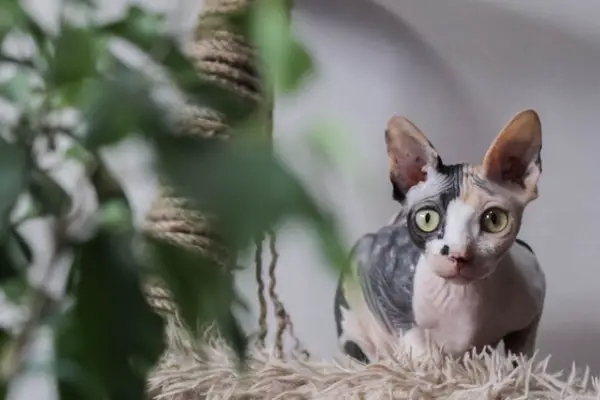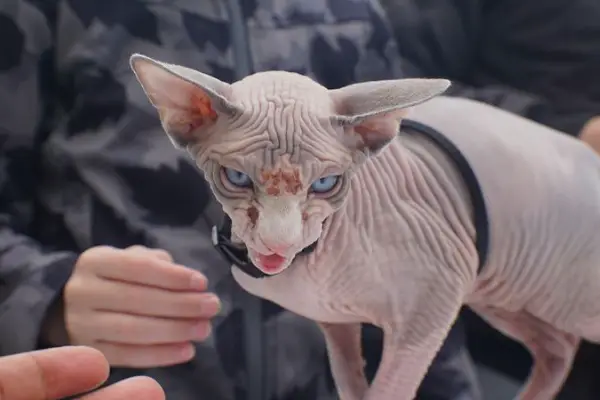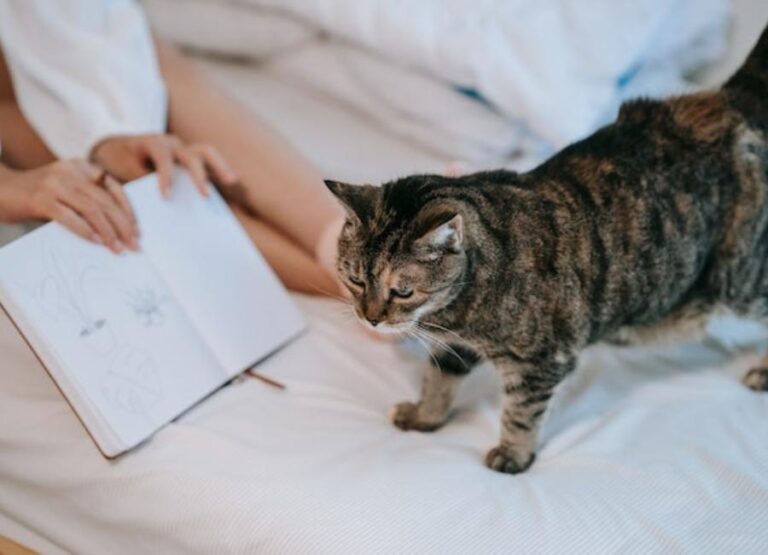9 Common Sphynx Cat Behavior Problems

Sphynx cats are affectionate towards their owners, but Sphynx cat behavior problems are something you should not overlook.
In this post, I will be discussing all the most common Sphynx cat behavior problems you should know.
This is not to discourage you from getting one, but to give you an insight into what you should expect from owning a Sphynx cat.
Common Sphynx Cat Behavior Problems
Here are some common Sphynx cat behavior problems you should know:
1. Sphynx cats are prone to separation anxiety
Do you want a cat you can leave all day long and go for your daily activities? Then Sphynx cat is the wrong choice for you.
Sphynx cats are so affectionate towards their owners that it becomes a problem when their owners are not around.
This separation anxiety behavior can be prevented by getting a second cat or making out more time to spend with your Sphynx cat.
People say Sphynx cats are mean, and separation anxiety is one of the behavior problems that can trigger off aggression in Sphynx cats.
This means that Sphynx cats can not be left alone for too long else they will develop separation anxiety.
2. Sphynx cats are too clingy and needy
If you are the type that is always at home and won’t mind your cat following you around or wanting your undivided attention then Sphynx cat is good for you.
On the other hand, if you want a cat that understands privacy that will not cling to you all day long, then Sphynx cat is not for you.
Sphynx cats are known to be very clingy and needy which is a good thing for some and also a bad thing for some people.
3. Sphynx cats are territorial and possessive
The need to be dominant is another issue with most Sphynx cats’ behavior.
The majority of Sphynx cats are born with the capacity to detect fear or subservience in another cat.
To establish territory and dominance, most Sphynx cats can prey on or even fight other cats
This Sphynx cat behavior feature is connected to most Sphynx cats’ innate jealousy.
Some Sphynx cats even use their odors to identify their territory.
Sphynx is a cat breed that demands to be the center of attention in all settings and will bully other animals to achieve that goal.
4. Sphynx cats avoid litter box when stressed
One of the most prevalent Sphynx cat behavior concerns is avoiding litter boxes when they are bored, irritated, depressed, or ill.
It’s most common when you first bring your Sphynx cat home, and it might signal a lack of litter boxes or the need for a cleaned litter box in their new environment.
Sphynx cats may develop litter box troubles when you bring a new family member home, even if they haven’t exhibited any indications of it previously.
Anxiety or a lack of comfort in your Sphynx cat’s environment might be one of the causes of recurring litter box issues.
5. Sphynx cats are easily depressed
Sphynx cats are known for their high levels of activity, vitality, and energy. They prefer being kept busy all of the time.
Most Sphynx cats get depressed as a result of separation anxiety, loneliness, or a constant shift in routine.
If a Sphynx cat’s sadness isn’t handled, it might lead to excessively aggressive behavior against other members of the household.
A depressed Sphynx cat may attempt to run and become a wild cat, or it may bite and nip.
6. Sphynx cats can be vocal on need
Most Sphynx cat owners battle with this since it is one of the most frequent Sphynx cat behavior concerns.
If you don’t listen to a Sphynx cat when they need anything, they’ll grow enraged, clawing objects or crying.
Sphynx cats always want to be in charge; for example, if you’re standing, they won’t stop until you sit down with them.
Sphynx cats may get a little too noisy when they need something, even if it’s something they can get without you.
Sphynx cats are notorious for talking excessively for a variety of reasons.
7. Sphynx cats seek for constant companionship
Sphynx cats are very curious about their owners’ activities and want to be around them at all times.
Your Sphynx cat will follow you around all day if you allow it, which might lead to a behavior problem if you are not home.
Sphynx cats are lively cats with a lot of energy that require a lot of stimulation or they will develop behavioral problems.
When you are not paying attention to them, they are prone to separation anxiety and might ruin items or even bite out of irritation.
8. Sphynx Cats are prone to climbing
Just like every other cat, Sphynx cats love to climb up to places where they may get trapped.
While this is a problem to some owners, others enjoy seeing their Sphynx cat explore.
The problem with this behavior is that they may get injured when trying to climb down from heights.
Make sure you make every place you climb to be safe and easy for them to climb up and down.
9. Sphynx cats can be destructive when bored
When bored, Sphynx cats are prone to destructive activity.
A Sphynx cat will wreak more harm than an ordinary alley cat if bored and able to escape.
This is because they are high-energy cats who demand a lot of mental and physical activity.
Getting a Sphynx cat is a mistake if you aren’t always around or if the cat doesn’t have a companion.
Boredom and this all-too-common problem behavior are inextricably linked.
If not given enough stimulus, Sphynx cats can become destructive.
It’s easy for them to become bored because they’re such high-energy cats.
Ways to stop unwanted behaviors in Sphynx cats
Here are some pointers to help you stop or prevent your Sphynx cat from behaving badly:
- Recognize and address the emotional and physical requirements of your Sphynx cat.
- From the time it is a kitten, your Sphynx cat must be well socialized.
- A second pet, either a cat or a dog, should be provided as it can help prevent separation anxiety.
- Instead of yelling at your Sphynx cat, be patient and make the necessary changes.
- Veterinary examinations are necessary on a regular basis.
- Purchase a large number of fascinating and interactive toys for your Sphynx cat.
- Every day, give your Sphynx cat some type of exercise, even if it’s fetch game.
- Positive conduct should always be rewarded, while negative behavior should be discouraged.
- Positive reinforcement should always be used instead of negative or severe reinforcement.

![New Cat Hiding And Not Eating [Explained] New Cat Hiding And Not Eating](https://petcreeks.com/wp-content/uploads/2023/02/New-Cat-Hiding-And-Not-Eating-768x555.jpg)
![Do Cats Need To Go Outside [Pros & Cons] Do Cats Need To Go Outside](https://petcreeks.com/wp-content/uploads/2021/08/Do-Cats-Need-To-Go-Outside-768x644.jpg)



